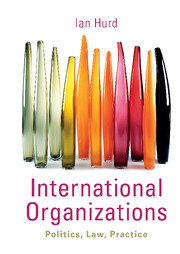Book contents
- Frontmatter
- Contents
- Preface
- Acknowledgement
- 1 Introduction to international organizations
- 2 A guide to the study of international organizations
- 3 The World Trade Organization
- 4 The International Monetary Fund and the World Bank
- 5 The United Nations I
- 6 The United Nations II
- 7 The International Labor Organization
- 8 The International Court of Justice
- 9 The International Criminal Court
- 10 Regional Organizations
- 11 Conclusion
- Index
7 - The International Labor Organization
- Frontmatter
- Contents
- Preface
- Acknowledgement
- 1 Introduction to international organizations
- 2 A guide to the study of international organizations
- 3 The World Trade Organization
- 4 The International Monetary Fund and the World Bank
- 5 The United Nations I
- 6 The United Nations II
- 7 The International Labor Organization
- 8 The International Court of Justice
- 9 The International Criminal Court
- 10 Regional Organizations
- 11 Conclusion
- Index
Summary
Key facts
Headquarters: Geneva
Members: 183 countries
Mandate: to recommend to members regulations for the safety and health of workers.
Key structure: plenary organization includes representatives of government, unions, and employers, and issues recommendations (“conventions”) to states.
Key obligations: member states must consider ILO conventions for adoption, but are not required to adopt them.
Enforcement: the Governing Body can recommend punishments against countries that fail in their obligations under the conventions.
Key legal clauses of the ILO Constitution:
Article 19(2) on voting for new conventions and recommendations.
Article 19(5) on states' obligations to consider ratifying a convention.
Article 19(6) on states' obligations toward recommendations.
Article 22 on states' obligations to report each year on each convention it has ratified.
Article 33 on enforcement.
The challenge that capitalism presents to workers and the environment is that firms face perpetual incentives to reduce wages and exploit nature in order to lower their costs. A capitalist inter-state system enhances these incentives. The International Labor Organization was created during an earlier period of “globalization” to respond to this challenge. The organization produces labor regulations which its member governments are encouraged to adopt as domestic laws. Its structure and authority are highly peculiar, reflecting the highly political nature of its subject matter. It includes representatives of labor and employer groups from each member country, alongside representatives of their governments. It also has no authority to impose rules on members, relying instead on the process of deliberation to generate rules that will be appealing to states' self-interests.
- Type
- Chapter
- Information
- International OrganizationsPolitics, Law, Practice, pp. 161 - 185Publisher: Cambridge University PressPrint publication year: 2010



